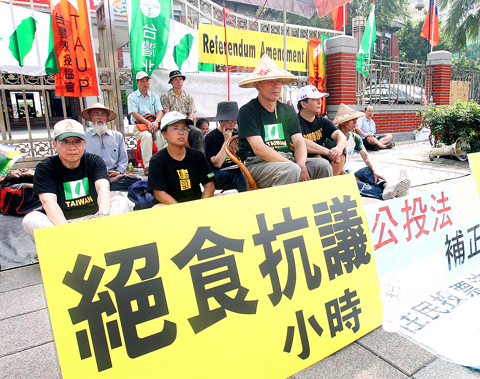Several pro-localization activists led by the Taiwan Association of University Professors (TAUP) continued their hunger strike in front of the legislature yesterday.
Wearing black T-shirts with the slogans “Taiwan is my country” and “Love Made in Taiwan,” the protesters are demanding an amendment to the Referendum Law (公投法).
The law, enacted by the Chinese Nationalist Party-dominated (KMT) legislature in 2003, stipulates that the number of signatures required for a referendum proposal to be reviewed is 0.5 percent of the voters who participated in the most recent presidential election — or approximately 80,000 individuals — with an additional 5 percent signatures from the population needed for a referendum to be held.

PHOTO: CNA
The law has long been criticized by the Democratic Progressive Party (DPP) as a “bird cage” law. The DPP has made several attempts to have the law amended over the past several years, but its proposals never clear the legislative floor.
The protesters began the hunger strike after participating in the opposition rally on Ketagalan Boulevard on Saturday. They have remained in front of the legislature since, with posters written in Chinese, Japanese and English demanding an amendment to the Referendum Law.
“I’m protesting against the Legislative Yuan by staging a hunger strike,” TAUP chairman Tsai Ting-kuei (蔡丁貴) said. “I will stay here until the law is amended.”
Tsai called for changes to the high thresholds stipulated in the law for a referendum to be passed.
A participant at the hunger strike surnamed Chueh (闕) said that everyone in Taiwan should stand up and oppose the KMT administration’s pro-China policy, saying it was “a matter of life and death.”

Taiwan is to commence mass production of the Tien Kung (天弓, “Sky Bow”) III, IV and V missiles by the second quarter of this year if the legislature approves the government’s NT$1.25 trillion (US$39.78 billion) special defense budget, an official said yesterday. Commenting on condition of anonymity, a defense official with knowledge of the matter said that the advanced systems are expected to provide crucial capabilities against ballistic and cruise missiles for the proposed “T-Dome,” an advanced, multi-layered air defense network. The Tien Kung III is an air defense missile with a maximum interception altitude of 35km. The Tien Kung IV and V

The disruption of 941 flights in and out of Taiwan due to China’s large-scale military exercises was no accident, but rather the result of a “quasi-blockade” used to simulate creating the air and sea routes needed for an amphibious landing, a military expert said. The disruptions occurred on Tuesday and lasted about 10 hours as China conducted live-fire drills in the Taiwan Strait. The Civil Aviation Administration (CAA) said the exercises affected 857 international flights and 84 domestic flights, affecting more than 100,000 travelers. Su Tzu-yun (蘇紫雲), a research fellow at the government-sponsored Institute for National Defense and Security Research, said the air

A strong continental cold air mass is to bring pollutants to Taiwan from tomorrow, the Ministry of Environment said today, as it issued an “orange” air quality alert for most of the country. All of Taiwan except for Hualien and Taitung counties is to be under an “orange” air quality alert tomorrow, indicating air quality that is unhealthy for sensitive groups. In China, areas from Shandong to Shanghai have been enveloped in haze since Saturday, the ministry said in a news release. Yesterday, hourly concentrations of PM2.5 in these areas ranged from 65 to 160 micrograms per cubic meter (mg/m³), and pollutants were

Taiwan’s armed forces have established response protocols for a wide range of sudden contingencies, including the “Wan Chun Plan” to protect the head of state, the Ministry of Defense (MND) said today. After US President Donald Trump on Saturday launched a series of airstrikes in Venezuela and kidnapped Venezuelan President Nicolas Maduro, concerns have been raised as to whether China would launch a similar “decapitation strike” on Taiwan. The armed forces regularly coordinate with relevant agencies and practice drills to ensure preparedness for a wide range of scenarios, Vice Minister of National Defense Hsu Szu-chien (徐斯儉) told reporters before a